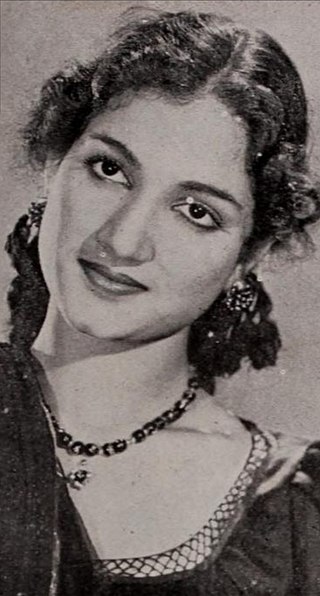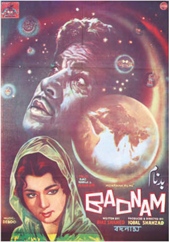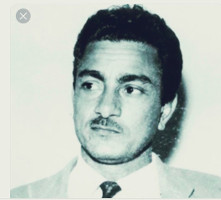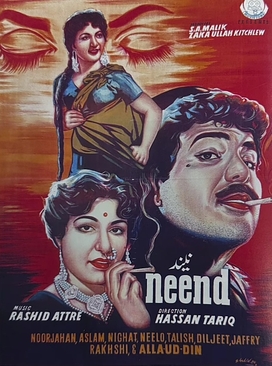
Noor Jehan, also known by her honorific title Malika-e-Tarannum, was a Pakistani playback singer and actress who worked first in British India and then in the cinema of Pakistan. Her career spanned more than six decades. Considered to be one of the greatest and most influential singers in Indian subcontinent, she was given the honorific title of Malika-e-Tarannum in Pakistan. She had a command of Hindustani classical music as well as other music genres.

Sabira Begum better known as Asha Posley was the first heroine of Pakistani films.

Naseem Begum, known professionally as Mala, was a Pakistani playback singer of Urdu and Punjabi films.

Inayat Hussain Bhatti (Urdu: عِنایَت حُسَین بھٹّی)(12 January 1928 – 31 May 1999) was a Pakistani film playback singer, film actor, producer, director, script writer, social worker, columnist, religious scholar and a promoter of the development of the Punjabi language and literature.

Masood Rana (Urdu: مسعُود رانا), was a Pakistani film playback singer. He began his singing career in 1962 with the film Inqalab, became one of the top male singers in both Urdu and Punjabi films for more than three decades and remained a busy singer until his death in 1995.

Badnaam is a Pakistani film in Urdu language, released on 2 September 1966, adapted from Saadat Hasan Manto's short story Jhumkay ("Ear-rings") by screenwriter Riaz Shahid, and was the second film adaptation of the Manto's story after 1946 Bollywood adaptation. The film was directed and produced by Iqbal Shehzad, in his debut as a film director. Badnaam's cast included Allauddin, Nabeela, Neelo, Ejaz Durrani, Diljeet Mirza, Hameed Wain, Rangeela and Zumurrud.

Riaz Shahid was a Pakistani filmmaker, film writer, and a journalist.
Neelo Begum was a Pakistani veteran film actress. She made her film debut in 1956 with Hollywood film Bhowani Junction. She was known as The Queen of Romance and The Princess of Romance for her portrayal of romantic roles. She worked in more than 134 Pakistani films including Urdu and Punjabi language films.
Noel Dias, better known as Saleem Raza, was a Pakistani playback singer. He converted to Islam and started his singing career from Lahore, Pakistan, quickly gaining popularity. Raza was a classically- trained singer and was more famous for singing sad songs. Raza's career suffered due to the rise of singer Ahmed Rushdi in the late 1950s. He left playback singing in 1966 as he lost his popularity with the film composers and moved to Canada where he died in 1983.
Do Raste is a 1961 Pakistani film directed ghouri malik produced by Malik Abdul rauf, starting Bahar Begum, Yousuf Khan, Ejaz Durrani, Neelo, and Talish with music by Master Inayat Hussain also known as Inayat Hussain.
Abdul Rasheed Attray, also known as Rasheed Attre, was a Pakistani film score composer.
Master Inayat Hussain was a Pakistani film music composer.

Zarqa is a 1969 Pakistani epic historical drama film directed, produced and written by Riaz Shahid while the music is composed by Rashid Attre and Wajahat Attre. It features Neelo, Alauddin, Ejaz Durrani, Saqi and Nasira as protagonist characters. It is based on the life of Zarqa, a Palestinian dancer girl and a freedom activist, who killed herself for the liberation of Palestine involving Israeli-occupied territories and Palestinian liberation movement. It also addresses a real event of Neelo when she was forcibly invited by Nawab Malik Amir Mohammad Khan, the governor of West Pakistan to his office to perform a stage dance during the 1965's official visit of Mohammad Reza Pahlavi to Pakistan.
Azra Aftab is a Pakistani actress. She is known for her roles in dramas Dhuwan, Manzil, Laag, Dasht and Madiha Maliha.

Saat Lakh is 1957 Pakistani Urdu film directed by Jaffer Malik and produced by Saifuddin Saif. It stars Sabiha Khanum and Santosh Kumar in the lead with supporting role by Nayyar Sultana and guest appearance by Neelo. The film is primarily known for its blockbuster music composed by Rashid Attre.

Neend is a Pakistani drama film directed by Hassan Tariq in his directorial debut and released in 1959. Based on a story and screenplay by Riaz Shahid, the films stars Noor Jehan, Neelo and Aslam Pervaiz with Nighat Sultana, Allauddin and Agha Talish in supporting roles. The music was done by Rashid Attre while Noor Jehan also sang her own songs in the film.
Naheed Niazi is a former Pakistani playback singer who performed in the Lollywood movies during the era of 1960s. She is married to musician Muslehuddin; her sister is the singer Najma Niazi. She is known for her playback songs, "Chali Re Chali Re Main To Des Piya Ke Chali Re", "Raat Saloni Ayi", and others.
Nagin is a Pakistani fantasy musical film, directed by Khalil Qaiser and was his first Urdu film as a director. It was produced by Wazir Ali under banner Films Hayat. It stars Neelo in the titular role and her first leading role with Rattan Kumar in his first leading role as an adult. It also marked his second appearance in dual role in Pakistani cinema. The supporting cast includes Husna, Yousuf Khan, Nazar and Saqi. Music of the film was composed by Safdar Hussain.
Beti is a Pakistani film directed by Raza Mir and produced by Iqbal Shehzad. Nazim Panipati was the story writer, with dialogues by Zia Sarhadi. It stars Neelo and Ejaz with child actor Gutto in lead roles. The plot revolves around a famous actress who accepts anonymity to save her daughter and house. The music was composed by Deebo Bhattacharya. Released in July 1964, it was the first film of Mir as director. Beti is considered as one of the best performance of Neelo.










